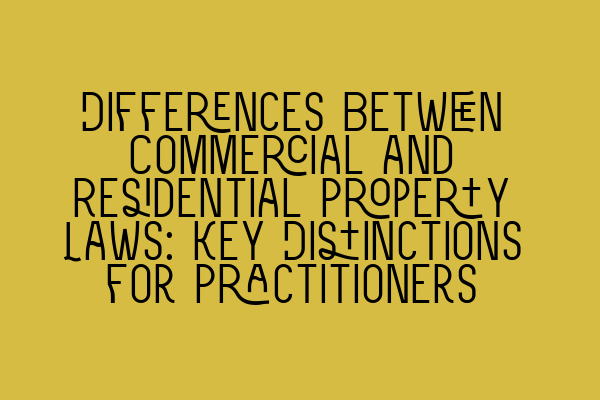Differences Between Commercial and Residential Property Laws: Key Distinctions for Practitioners
Welcome to SQE Property Law & Land Law, where we specialize in providing expert legal advice and services in the field of property law. As solicitors, writers, and SEO experts, we understand the importance of staying up-to-date with the latest developments and sharing valuable insights with our clients and colleagues. In this blog post, we will explore the key distinctions between commercial and residential property laws, providing practitioners with an in-depth understanding of the differences. Whether you are a seasoned practitioner or a budding legal professional, this article will serve as a valuable resource in your practice.
The Nature of Commercial Property
Commercial property refers to properties that are used for business or investment purposes. This can include office buildings, retail spaces, industrial warehouses, and more. When dealing with commercial property, practitioners must navigate a complex legal framework that is tailored to meet the unique needs and considerations of commercial transactions. Understanding the key distinctions between commercial and residential property laws is crucial for practitioners to effectively advise their clients and ensure compliance with relevant regulations.
Contractual Framework
One of the main distinctions between commercial and residential property laws lies in the contractual framework. Commercial property transactions often involve more complex and detailed contracts compared to residential property transactions. These contracts may include provisions relating to rent reviews, service charges, lease durations, and tenant improvements. As a practitioner, it is essential to have a comprehensive understanding of these contractual provisions and their implications for your clients.
For further preparation on the SQE exams, we recommend taking a look at our SQE 1 Practice Exam Questions and SQE 1 Practice Mocks FLK1 FLK2 articles.
Tenant and Landlord Responsibilities
Another key distinction between commercial and residential property laws lies in the respective responsibilities of tenants and landlords. In commercial leases, there is often more flexibility for landlords to shift responsibilities and costs onto tenants. This can include obligations related to maintenance, repairs, and insurance. It is important for practitioners to advise their clients on the implications of these responsibilities and negotiate favorable terms to protect their clients’ interests.
Regulatory Framework
The regulatory framework for commercial and residential property laws also differs significantly. Commercial property is subject to various regulations, including planning permissions, health and safety requirements, and zoning laws. These regulations aim to ensure that commercial properties are fit for business purposes and adhere to specific industry standards. Practitioners must have a solid understanding of these regulations to guide their clients through compliance and address any potential legal challenges.
To enhance your knowledge and preparation for the SQE exams, we recommend exploring our comprehensive SQE 2 Preparation Courses as well as our specialized SQE 1 Preparation Courses.
Dispute Resolution
Disputes can arise in both commercial and residential property transactions, but the resolution process can differ significantly. Commercial disputes often require a more sophisticated approach, including negotiation, arbitration, or litigation if necessary. Residential disputes, on the other hand, may be resolved through alternative dispute resolution methods or specialized housing tribunals. As a practitioner, being well-versed in the dispute resolution procedures for both commercial and residential properties is essential to successfully advocate for your clients.
SQE Exam Dates
For information on upcoming SRA SQE Exam Dates and registration details, please visit our article on SRA SQE Exam Dates.
Conclusion
In conclusion, the distinctions between commercial and residential property laws are numerous and significant. Practitioners must possess a deep understanding of these differences to effectively advise their clients and navigate the complexities of property transactions. Whether you are preparing for the SQE exams or seeking to enhance your expertise in property law, SQE Property Law & Land Law is dedicated to providing you with the knowledge and resources you need. We invite you to explore our full range of articles and courses to further enhance your professional development.
